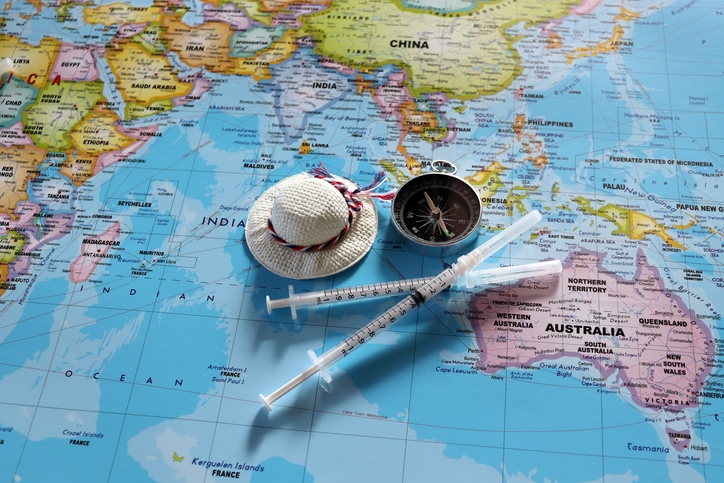Plastic Surgery Tourism: Navigating Safety And Quality

Are you considering traveling to another country for plastic surgery? You’re not alone. The popularity of plastic surgery tourism has skyrocketed in recent years, with people seeking more affordable options and the opportunity to combine cosmetic procedures with a vacation.
However, as with any medical procedure, there are risks involved, and it’s crucial to navigate the safety and quality of your chosen facility and surgeon.
In this article, we’ll guide you through the process of plastic surgery tourism, from understanding the risks involved to researching your options, choosing the right surgeon and facility, preparing for your procedure, and aftercare and follow-up visits.
By the end, you’ll have the knowledge and tools to enjoy your new look while staying safe and healthy.
Key Takeaways
- Plastic surgery tourism has both benefits and risks, including affordability and access to top surgeons, but also lack of regulation, language barriers, and travel and recovery complications.
- Research is crucial in ensuring the safety and quality of the procedure, including qualifications and accreditations of surgeons and clinics, reviews from past patients, and accreditation, experience, staff qualifications, safety protocols, technology, and equipment of the facility.
- Communication is key in avoiding misunderstandings and ensuring that goals and expectations are met, including open lines of communication, asking questions or concerns, and confirming dates, times, transportation, and accommodation arrangements.
- Aftercare is important in ensuring a successful recovery, including following pre-operative instructions, arranging for a support system, scheduling follow-up visits, and maintaining a healthy lifestyle.
The Popularity of Plastic Surgery Tourism
Plastic surgery tourism is totally trending right now, with more and more people jet-setting off to get their dream body at a fraction of the cost. Many people are drawn to the idea of combining a vacation with a cosmetic procedure, especially when the cost of the surgery in their home country is significantly higher. This trend is particularly popular in countries like Thailand, Brazil, and South Korea, where plastic surgery clinics have become a major industry.
However, it’s important to remember that plastic surgery is still a serious medical procedure, and traveling abroad for surgery can come with risks. While the cost savings may be tempting, it’s crucial to thoroughly research the clinic and surgeon before making a decision. Look for reviews from previous patients, check the credentials of the surgeon and staff, and make sure the clinic has proper accreditation and safety protocols in place.
By doing your due diligence, you can minimize the risks and have a safe and successful plastic surgery experience abroad.
Understanding the Risks Involved
You may be wondering about the potential hazards when considering going abroad for cosmetic procedures. It is important to understand that there are risks involved with any surgery, but when traveling to a foreign country for plastic surgery, there are additional factors to consider. One of the biggest risks is the lack of regulation and oversight in some countries. This means that the facility and staff may not be held to the same safety and quality standards as those in your home country. Additionally, language barriers and cultural differences can complicate communication and understanding of the procedure and aftercare instructions.
To help you understand the risks involved, here is a table outlining some of the common hazards associated with plastic surgery tourism:
| Risk factor | Explanation | Potential consequences |
|---|---|---|
| Lack of regulation | Some countries may not have strict regulations for surgical facilities and staff | Increased risk of infection, complications, and poor outcomes |
| Language barriers | Communication difficulties due to language differences | Misunderstandings about procedures, aftercare, and complications |
| Cultural differences | Differences in cultural norms and expectations | Miscommunication and unrealistic expectations |
| Travel complications | Travel-related issues such as flight delays, jet lag, and unfamiliar surroundings | Increased risk of complications and difficulty accessing follow-up care |
| Recovery complications | Difficulty accessing follow-up care and support during recovery | Increased risk of complications and poor outcomes |
While plastic surgery tourism may seem like an attractive option for cost savings and exotic destinations, it is important to thoroughly research and understand the potential risks involved. By doing so, you can make an informed decision that prioritizes your safety and well-being.
Researching Your Options
When considering going abroad for cosmetic procedures, it’s crucial to thoroughly research your options to ensure a successful outcome. Start by researching the country you’re interested in visiting and checking their regulations for cosmetic surgery.
Look into the qualifications and accreditations of the surgeons and clinics you’re considering, and read reviews from past patients to get a sense of their experiences. Additionally, consider the costs associated with the procedure, including travel and accommodations, and compare them to those in your home country.
It’s also important to consider the language barrier and cultural differences that may come into play during your trip. Make sure you’re comfortable communicating with your surgeon and medical staff, and that you fully understand the procedure and post-operative instructions.
Lastly, have a plan in place for any potential complications or emergencies. Research local healthcare facilities and make sure you have access to medical care if needed.
By taking the time to thoroughly research your options, you can increase your chances of a successful and safe plastic surgery tourism experience.
Qualifications to Look for in a Surgeon
It’s crucial to identify the qualifications that you should look for in a surgeon before considering going abroad for a cosmetic procedure.
Firstly, make sure that the surgeon is board-certified in plastic surgery in their home country. This means that they’ve undergone rigorous training and have passed exams to become certified.
Additionally, look for a surgeon with extensive experience in the specific procedure you’re interested in. This ensures that they have a track record of successful surgeries and are familiar with the latest techniques and technologies.
Another important qualification to consider is the surgeon’s communication skills. You should feel comfortable discussing your concerns and expectations with them, and they should be able to explain the procedure, risks, and recovery process clearly and thoroughly.
It’s also a good idea to read reviews and testimonials from previous patients to get a sense of their experiences with the surgeon. By taking the time to research and carefully choose a qualified surgeon, you can help ensure a safe and successful plastic surgery abroad experience.
Choosing the Right Facility
If you’re planning to have a cosmetic procedure done abroad, finding the right facility is essential. Not all clinics or hospitals are created equal, and you need to ensure that the facility you choose is safe, reputable, and equipped with the latest technology and equipment.
Here are some things to consider when choosing the right facility for your plastic surgery abroad:
- Accreditation: Look for a facility that’s accredited by a recognized organization, such as the Joint Commission International or the International Society for Quality in Healthcare. Accreditation ensures that the facility has met certain standards for safety and quality of care.
- Experience: Check the facility’s track record for performing the specific procedure you’re interested in. Look for before and after photos of previous patients, read reviews and testimonials, and ask for references.
- Staff qualifications: Make sure the facility employs experienced and qualified staff, including surgeons, anesthesiologists, nurses, and other healthcare professionals. Check their credentials and make sure they have the necessary licenses and certifications.
- Safety protocols: Ask about the facility’s safety protocols and infection control measures. Make sure they follow international standards for patient safety, and that they have emergency procedures in place in case of complications.
- Technology and equipment: Look for a facility that uses modern, state-of-the-art technology and equipment for your procedure. This can help ensure better results and a faster recovery time.
By following these guidelines, you can find a facility that meets your needs and gives you the best possible chance of a successful outcome.
Communicating with Your Surgeon and Staff
Effective communication with your surgeon and their staff is crucial for a successful and satisfying cosmetic procedure abroad. Before traveling to your destination, make sure to establish open lines of communication with your surgeon and their team. Ask about their experience, training, and credentials, as well as their approach to patient care. Share your goals and expectations for the procedure, and ask any questions or concerns you may have. This will help ensure that you and your surgeon are on the same page, and that you feel comfortable and confident throughout the process.
In addition to discussing the procedure itself, it’s important to communicate about logistics and post-operative care. Ask about the recovery process, including any restrictions or special instructions you should follow. Confirm the dates and times of your appointments, and ask about any transportation or accommodation arrangements that need to be made. By being proactive and clear in your communication, you can help ensure that your plastic surgery tourism experience is safe, successful, and satisfying.
| PROS | CONS |
|---|---|
| Affordable prices | Language barrier |
| Access to top surgeons | Limited follow-up care |
| Opportunity for a vacation | Lack of familiarity with local regulations |
The decision to pursue plastic surgery tourism can be a difficult one, as it involves navigating safety and quality concerns in an unfamiliar environment. However, as the table above shows, there are also potential benefits to this approach, such as affordable prices and access to top surgeons. By understanding the pros and cons, and communicating effectively with your surgeon and their staff, you can make an informed decision that meets your needs and priorities.
Preparing for Your Procedure
To get ready for your procedure, you’ll need to take some important steps to ensure a smooth and successful experience. Here are some things to keep in mind:
- Follow your surgeon’s pre-operative instructions carefully. This may include avoiding certain medications or foods, quitting smoking, or arranging for transportation to and from the surgery center.
- Prepare your home for your recovery period. This may include setting up a comfortable recovery area with easy access to necessary items, such as pillows, blankets, and medications.
- Arrange for a support system. Having friends or family members available to assist with your post-operative care can be incredibly helpful. This may include helping with household chores, driving you to follow-up appointments, and providing emotional support.
By taking these steps and staying organized, you can help ensure a successful and satisfying plastic surgery experience.
Remember to communicate any concerns or questions you may have with your surgeon and staff, and always prioritize your safety and well-being.
Aftercare and Follow-Up Visits
Don’t forget to schedule your follow-up visits and take care of yourself during the aftercare period to ensure the best possible outcome. Your surgeon will provide you with specific instructions on how to care for yourself, what to expect during the recovery period, and when you should come back for follow-up visits. It’s important to follow these instructions carefully to avoid complications and ensure a successful recovery.
During the aftercare period, it’s important to take care of yourself by getting plenty of rest, staying hydrated, and avoiding strenuous activities. Your surgeon may also recommend certain medications or treatments to help manage any pain or discomfort you may experience. Additionally, it’s important to keep your incisions clean and dry to prevent infection. By following these guidelines and attending your follow-up visits, you can help ensure the best possible outcome for your plastic surgery procedure.
| Aftercare Tips | Follow-Up Visits | |||
|---|---|---|---|---|
| Get plenty of rest | Schedule appointments as recommended | |||
| Stay hydrated | Ask any questions or voice concerns | |||
| Avoid strenuous activities | Follow specific instructions for care | |||
| Keep incisions clean and dry | Discuss any potential complications | Continue taking any prescribed medications as directed | Report any unusual symptoms or side effects to your healthcare provider |
Enjoying Your New Look While Staying Safe
Now that you’ve achieved your desired look, it’s important to continue taking care of yourself and following your surgeon’s instructions to ensure a long-lasting outcome.
While it may be tempting to show off your new look by hitting the beach or engaging in other physical activities, it’s important to remember that your body needs time to heal. Avoid excessive sun exposure, as this can lead to scarring and discoloration. Additionally, avoid any strenuous activities or heavy lifting until your surgeon gives you the green light to resume normal activities.
In order to preserve your new look, it’s also important to maintain a healthy lifestyle. This includes eating a balanced diet, getting enough sleep, and exercising regularly. Not only will this help you maintain your new figure, but it will also improve your overall health and well-being.
By taking care of yourself and following your surgeon’s instructions, you can enjoy your new look while staying safe and healthy.
Frequently Asked Questions
How much money can I save by getting plastic surgery done abroad?
You can save a considerable amount of money by getting plastic surgery done abroad. However, it’s important to weigh the cost savings against potential risks and complications, such as language barriers, lack of follow-up care, and lower safety standards.
Are there any legal implications of getting plastic surgery done abroad?
You may face legal implications if you get plastic surgery done abroad. Laws vary by country and you may not have the same rights or protections as you would at home. Make sure to research and understand the laws before undergoing any procedures.
Can I get a refund if I am not satisfied with the results of my plastic surgery procedure?
If you’re not satisfied with the results of your plastic surgery procedure, getting a refund can be difficult. Before proceeding, you should carefully review the terms and conditions of your contract and discuss your concerns with your surgeon.
Can I bring a friend or family member with me for support during my plastic surgery trip?
Yes, you can bring a friend or family member with you for support during your plastic surgery trip. However, their presence may depend on the policies of the facility and the specific procedure you are undergoing.
What kind of insurance coverage do I need for plastic surgery tourism?
You should check with your current health insurance provider to see if they cover any complications that may arise from plastic surgery tourism. If not, you may need to purchase additional travel insurance with medical coverage.
Conclusion
Congratulations on making the decision to enhance your appearance with plastic surgery! As you navigate the world of plastic surgery tourism, it’s crucial to prioritize safety and quality.
This means understanding the risks involved and thoroughly researching your options before selecting a qualified surgeon and facility. When choosing a surgeon, look for qualifications such as board certification and experience in your desired procedure.
Communication with your surgeon and staff is also key in ensuring a successful outcome. Prior to your procedure, make sure to prepare adequately and follow all aftercare instructions. With careful planning and attention to detail, you can enjoy your new look while staying safe and healthy.







